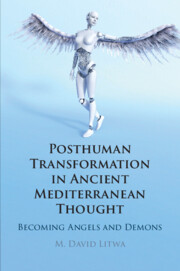
-
Select format
-
- Publisher:
- Cambridge University Press
- Publication date:
- 24 December 2020
- 07 January 2021
- ISBN:
- 9781108921572
- 9781108843997
- 9781108926058
- Dimensions:
- (228 x 152 mm)
- Weight & Pages:
- 0.44kg, 206 Pages
- Dimensions:
- (229 x 152 mm)
- Weight & Pages:
- 0.32kg, 206 Pages
- Subjects:
- Classical Studies, Ancient Philosophy, Religion, Church History
You may already have access via personal or institutional login- Subjects:
- Classical Studies, Ancient Philosophy, Religion, Church History
Book description
There is not just a desire but a profound human need for enhancement - the irrepressible yearning to become better than ourselves. Today, enhancement is often conceived of in terms of biotechnical intervention: genetic modification, prostheses, implants, drug therapy - even mind uploading. The theme of this book is an ancient form of enhancement: a physical upgrade that involves ethical practices of self-realization. It has been called 'angelification' - a transformation by which people become angels. The parallel process is 'daimonification', or becoming daimones. Ranging in time from Hesiod and Empedocles through Plato and Origen to Plotinus and Christian gnostics, this book explores not only how these two forms of posthuman transformation are related, but also how they connect and chasten modern visions of transhumanist enhancement which generally lack a robust account of moral improvement.
Reviews
‘In this pioneering and wide-ranging work, Posthuman Transformation in Ancient Mediterranean Thought, M. David Litwa connects contemporary conversations in transhumanist thought with ancient philosophical traditions of angelification (alternatively, 'daimonification'). Chief among this book’s virtues is its impressive range: Litwa provides comparative analyses of authors from Greco-Roman, Jewish, Christian, and Hermetic traditions, ranging from the 8th century BCE to the 3rd century CE. Litwa’s work is inclusive even of traditions too often treated as marginal (e.g., 'Gnostic' texts), providing a basis for fresh comparative insights.’
Travis W. Proctor Source: Reading Religion
‘This is an enjoyable, erudite, and informative book … This book should be read with interest and pleasure by scholars from a range of disciplines but is also accessible to undergraduates and general readers.’
Tom Mackenzie Source: Bryn Mawr Classical Review
‘In this pioneering and wide-ranging work, Posthuman Transformation in Ancient Mediterranean Thought, M. David Litwa connects contemporary conversations in transhumanist thought with ancient philosophical traditions of angelification (alternatively, ‘daimonification’). Chief among this book’s virtues is its impressive range: Litwa provides comparative analyses of authors from Greco-Roman, Jewish, Christian, and Hermetic traditions, ranging from the 8th century BCE to the 3rd century CE. Litwa’s work is inclusive even of traditions too often treated as marginal (e.g., ‘Gnostic’ texts), providing a basis for fresh comparative insights.'
Travis W. Proctor Source: Reading Religion
‘… the book will be of great interest to specialists in a variety of subfields, from scholars and students working on ancient Mediterranean religions - including of course Judaism and early Christianity - to anthropologists and sociologists who study ideas of human transformations across the globe in both past and present.’
Nickolas P. Roubekas Source: Religious Studies Review
Contents
Metrics
Altmetric attention score
Full text views
Full text views help Loading metrics...
Loading metrics...
* Views captured on Cambridge Core between #date#. This data will be updated every 24 hours.
Usage data cannot currently be displayed.
Accessibility standard: Unknown
Why this information is here
This section outlines the accessibility features of this content - including support for screen readers, full keyboard navigation and high-contrast display options. This may not be relevant for you.
Accessibility Information
Accessibility compliance for the PDF of this book is currently unknown and may be updated in the future.


